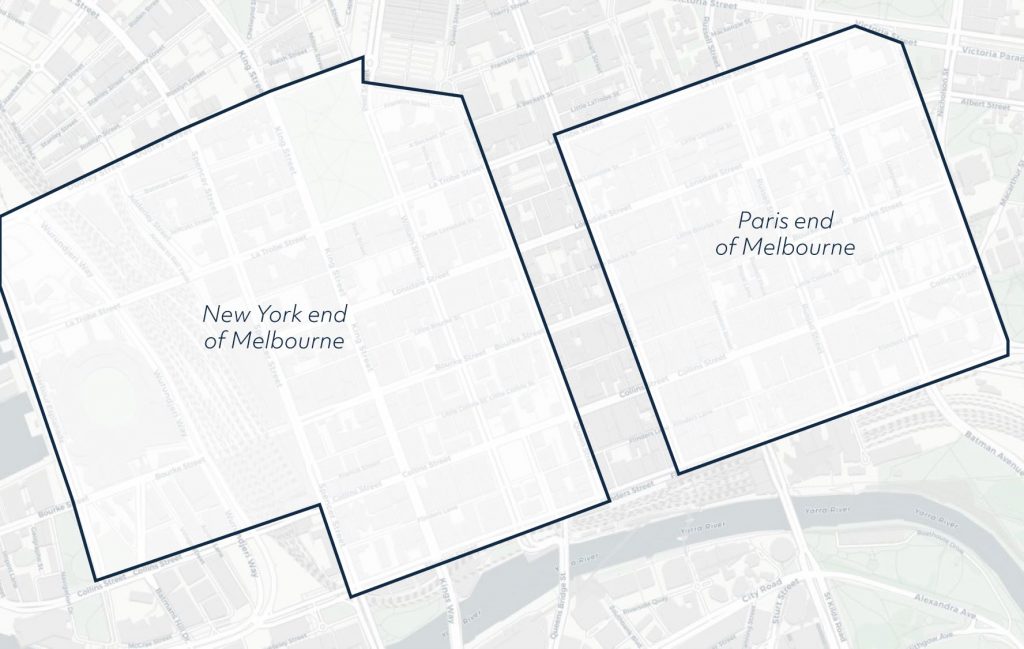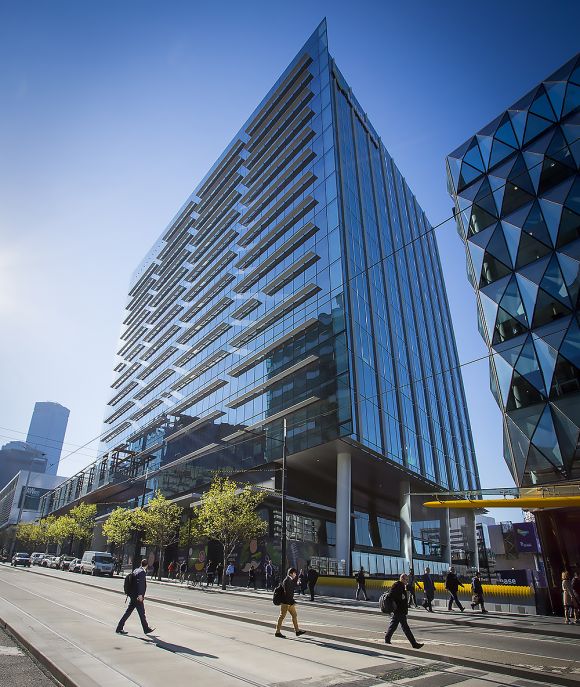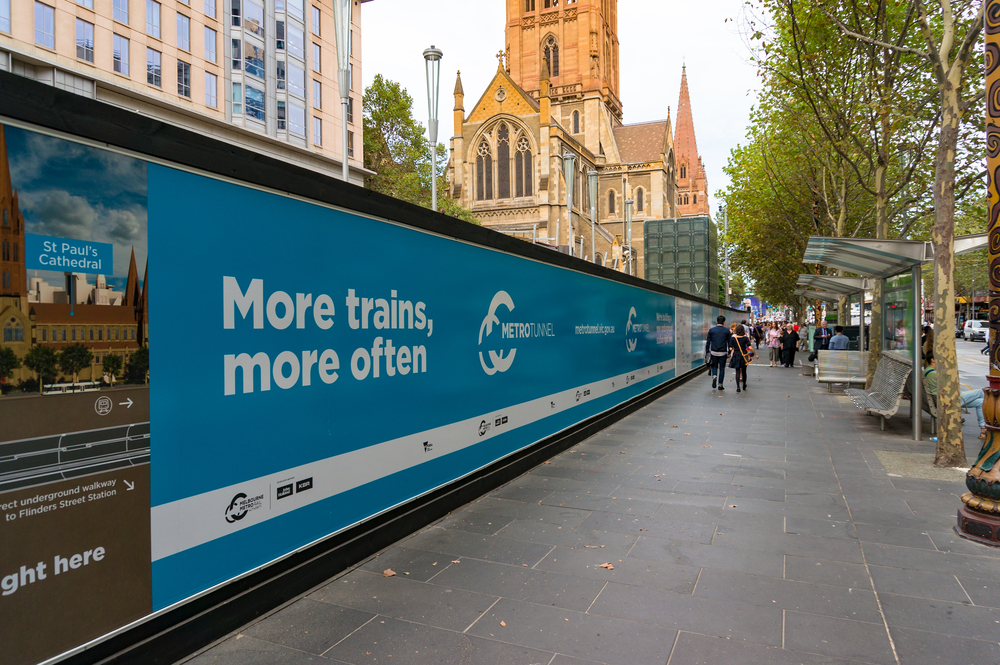Jobs boom in Melbourne’s New York end
Melbourne is a city that compares favourably to the iconic cities of the world. Consistently ranked in the top 3 most liveable cities, Melbourne has a thriving arts and music scene, 24-hour nightlife and world-class restaurants and bars.
Locals would say it’s a city not unlike New York – except with better coffee!
The comparison to New York isn’t a new one. In fact, in Melbourne’s CBD, the area west of William Street is often dubbed the New York end of town.
Juxtaposed against the ‘Paris end’ east of Swanston Street, with its heritage buildings, boutiques and sidewalk cafes, the New York end is Melbourne’s financial epicentre. It has flourished over the past 10-12 years as many national and international businesses have chosen to relocate to the western end of the CBD to new, first class commercial buildings.

indicative areas only
“The New York end of Melbourne’s CBD is not only the economic heartbeat of Australia’s fastest growing city with a booming economy and abundance of white-collar employment. It is also home to a growing ‘nouveau-riche’ population – who enjoy the hustle and bustle of urban life,” said Ironfish Melbourne CBD Managing Director Jimmy Yan.
This part of town has been a key driver of Melbourne’s surging jobs growth. Over 80,000 jobs were created in Greater Melbourne over the 12 months to August 2018 alone. This rate of growth is expected to continue for the foreseeable future, with the Australian Government estimating over 230,000 jobs to be made over the 5 years to May 2022.
Growing pressure for premium office space in Melbourne CBD
With the Victorian economy booming, so too is demand for premium Melbourne CBD office space. The current office vacancy rate for Melbourne CBD is only 4% – the lowest it’s been in 30 years. This is placing increasing pressure on commercial rents.
In the New York end, Mirvac is responding with its new 38-storey Olderfleet office development Tenants include law firm Lander and Rogers, as well as anchor tenant Deloitte, which has committed to more than 22,000sqm of office space in the building for 12 years.
Charter Hall Property Group has also made a substantial acquisition in the New York end of the CBD, spending $140 million on a prime Collins Street site, which once complete could house 70,000sqm of commercial office space, valued potentially in excess of $1 billion.

One Melbourne Quarter – Image: Lendlease
The first building at Melbourne Quarter officially opened last month, with Lendlease now moved in. It is the first commercial tower to be delivered as part of the $2 billion precinct at Collins Street. The building will accommodate 2,500 workers and feature other major tenants such as Arup and AMP. The precinct’s next commercial tower, Two Melbourne Quarter, is currently under construction. The 50,000sqm building is pre-committed by EnergyAustralia, and is expected to complete in mid-2020.
These projects re-affirm the New York end’s status as the economic and commercial epicentre of the Victorian capital, boasting some of the country’s most recognised companies. These include banking heavyweights Commonwealth Bank and NAB; insurance giants QBE Insurance and Medibank; top tier law firms Corrs Chambers Westgarth and Minter Ellison; media companies Fairfax Media, Channel 7 and Channel 9; energy businesses BP and AGL energy; consulting multinationals KPMG and Capgemini, and even government agencies such as the Australian Taxation Office (ATO).
Further down, in the Paris end of Collins Street, technology giant Google established its Melbourne base in July 2018. The company is just one of a number of major global tech companies investing in Melbourne, including Alibaba, Amazon, JD.com, LiveTiles, Mimecast, Slack, Zendesk and Square.
“These companies have been attracted by Victoria’s healthy investment climate and strong economy as well as its wealth of tech talent and vibrant tech ecosystem,” Victorian Minister for Small Business; Innovation and the Digital Economy; Trade and Investment, Philip Dalidakis said.
The largest investment in City of Melbourne history
Coinciding with the surge in jobs growth and commercial office demand, is a surge in infrastructure investment in and around Melbourne’s CBD.
On the culture, entertainment, and lifestyle front, the City of Melbourne’s quarter-billion dollar investment into the Queen Victoria Market Precinct Renewal represents the largest investment in the City of Melbourne’s history. The renewal project is expected to complete by 2022.
In April 2018, the Victorian Government announced a $225 million spend to upgrade the Docklands stadium. Just one month later, it was announced that Disney won the new naming rights of the former Etihad Stadium, to rebrand as Marvel Stadium for 8 years.
Football is an important part of Melbourne’s cultural make up and it’s also big business – the AFL alone is said to contribute $3 billion annually to the Victorian state economy.
“It’s an investment in the sports infrastructure that we need, the stadiums … that we need in order to stay number one,” Victorian Premier Daniel Andrews told ABC Radio Melbourne.

The $11 billion Melbourne Metro Tunnel is another example. Works are now underway on this massive infrastructure project and when complete, will greatly increase the appeal of areas within walking distance of the new stations.
Similarly, the long-promised Melbourne Tullamarine – CBD Airport Rail Link is finally becoming a reality. The Sunshine Route is the state government’s preferred route for the rail link and construction is expected to begin by 2022.
“Fourth-fasted growing developed city on the planet”
The Greater Melbourne population grew by 2.7% last year, faster than any major city in the United States, including the likes of New York, Boston and San Francisco.
Revised estimates have Melbourne set to surpass Sydney as Australia’s biggest city as early as 2028. Fast forward to 2050 and the city will have grown to 8 million – the size of New York or London today.
“It’s the fourth-fastest growing developed city on the planet today,” said demographer Bernard Salt.
Sydney and Melbourne population growth

Source: ABS and ABC
With a growing population and a housing market that has become unaffordable for many, more and more Melbourne residents are choosing inner-city apartment living. The Melbourne apartment market, in fact, outperformed all the other major capital city apartment markets over the 12 months to July 2018, recording a 4.2% gain. Rental yields are a healthy 4.3%.
“Living in the New York end means easy access to jobs, restaurants, bars, sporting games – the vibrant inner-city lifestyle that Melbourne has become famous for. For professionals who don’t want a long commute or need a big backyard, a premium inner-city apartment becomes the obvious choice,” added Mr Yan.
Ironfish property investment – Melbourne
Take a look at our selected properties in Melbourne’s New York end. Register here for exclusive access.